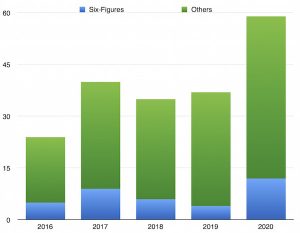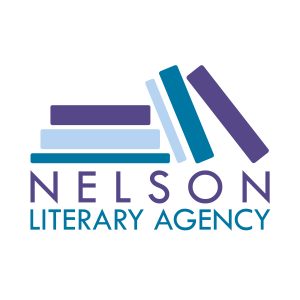For over a decade NLA has compiled our yearly stats. This year is no exception but with one big surprise in the data. And it’s all about queries and the possible impact of Covid.
4 : Number of agents at NLA (same as in 2019)
1 : Number of agents who made the Publishers Weekly Star Watch Finalists List. Congrats Quressa!
13,561 : Queries read and responded to. QueryManager gives us an exact number now. As a team, agents were closed to queries for 27% of the year, including for 8 months for Kristin, but we also think it’s because fewer writers queried in the time of Covid, so this is down from 14,000+ in 2019.
430 : Number of full manuscripts requested and read (up from 354 in 2019, as we had more time stuck at home to read): 71 requests for Kristin, 173 requests for Danielle, 77 requests for Quressa, 109 requests for Joanna.
106 : Number of manuscripts we requested that received offers of representation, either from us or from other agents/agencies (down from 127 in 2019, which might mean fewer folks have work out there on submission).
13 : Number of new clients who signed with NLA (1 for Kristin, 4 for Danielle, 4 for Quressa, 4 for Joanna). Four was the magic number for everyone except me, and this is down by only 1 from 2019, so go NLA team!
39 : Number of book deals done (16 for Kristin, 5 for Danielle with 1 debut, 11 for Quressa with 2 debuts, 7 for Joanna with 4 debuts). Way up from 26 in 2019.
2 : Number of debut New York Times bestsellers (1 for Quressa and 1 for Joanna, whose client debuted in the #1 position on the list!).
48 : Number of career New York Times bestsellers for Kristin (up from 45 in 2019).
8 : TV and major motion picture deals (6 for Kristin, 1 for Quressa, 1 for Joanna). Down from 11 in 2019.
41 : Books released in 2020 (down from 45 in 2019).
70 : Foreign-rights deals done (54 for Kristin, 7 for Danielle, 9 for Quressa). Down from 106 in 2019. Thanks, Covid.
0 : Physical Conferences attended. Thanks, Covid.
2 : Virtual Conferences attended by Kristin (both Denver-based: Lighthouse Writers LitFest and the inaugural Margins Conference).
102 : Physical holiday cards sent (down from 180 in 2019 as we only sent to clients during this Covid year).
837 : Electronic holiday cards sent (down by one from 838 in 2019).
Not telling it’s so embarrassing : homemade eggnog-chai lattes consumed during December because I wasn’t popping out to Starbucks.
Lots : Late nights reading on my living-room chaise and missing my dear, dear Chutney. Reading full manuscripts is just not the same without her.
Creative Commons Photo Credit: Clint Budd












